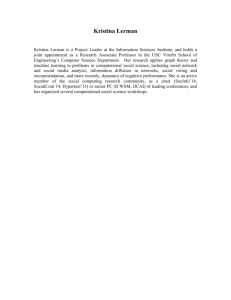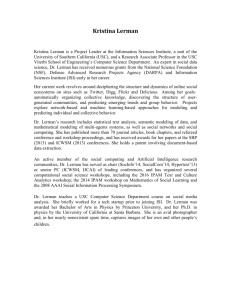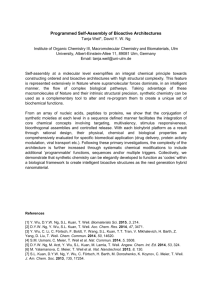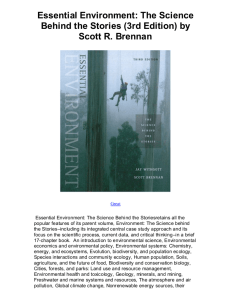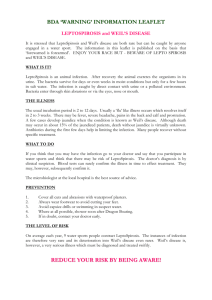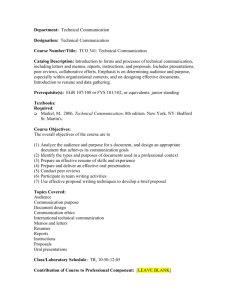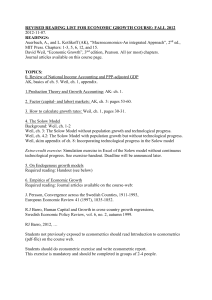Document 11165692
advertisement
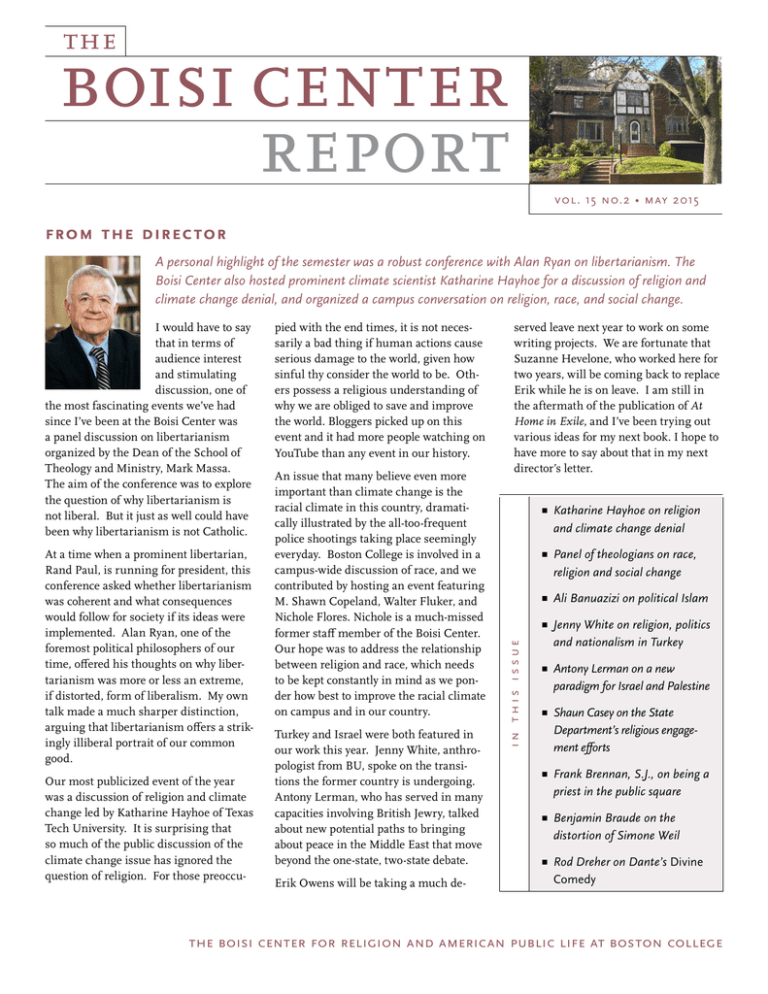
the boisi center report vol. 15 no.2 • may 2015 from the director A personal highlight of the semester was a robust conference with Alan Ryan on libertarianism. The Boisi Center also hosted prominent climate scientist Katharine Hayhoe for a discussion of religion and climate change denial, and organized a campus conversation on religion, race, and social change. At a time when a prominent libertarian, Rand Paul, is running for president, this conference asked whether libertarianism was coherent and what consequences would follow for society if its ideas were implemented. Alan Ryan, one of the foremost political philosophers of our time, offered his thoughts on why libertarianism was more or less an extreme, if distorted, form of liberalism. My own talk made a much sharper distinction, arguing that libertarianism offers a strikingly illiberal portrait of our common good. Our most publicized event of the year was a discussion of religion and climate change led by Katharine Hayhoe of Texas Tech University. It is surprising that so much of the public discussion of the climate change issue has ignored the question of religion. For those preoccu- pied with the end times, it is not necessarily a bad thing if human actions cause serious damage to the world, given how sinful thy consider the world to be. Others possess a religious understanding of why we are obliged to save and improve the world. Bloggers picked up on this event and it had more people watching on YouTube than any event in our history. An issue that many believe even more important than climate change is the racial climate in this country, dramatically illustrated by the all-too-frequent police shootings taking place seemingly everyday. Boston College is involved in a campus-wide discussion of race, and we contributed by hosting an event featuring M. Shawn Copeland, Walter Fluker, and Nichole Flores. Nichole is a much-missed former staff member of the Boisi Center. Our hope was to address the relationship between religion and race, which needs to be kept constantly in mind as we ponder how best to improve the racial climate on campus and in our country. Turkey and Israel were both featured in our work this year. Jenny White, anthropologist from BU, spoke on the transitions the former country is undergoing. Antony Lerman, who has served in many capacities involving British Jewry, talked about new potential paths to bringing about peace in the Middle East that move beyond the one-state, two-state debate. Erik Owens will be taking a much de- served leave next year to work on some writing projects. We are fortunate that Suzanne Hevelone, who worked here for two years, will be coming back to replace Erik while he is on leave. I am still in the aftermath of the publication of At Home in Exile, and I’ve been trying out various ideas for my next book. I hope to have more to say about that in my next director’s letter. QQ QQ QQ QQ in this issue I would have to say that in terms of audience interest and stimulating discussion, one of the most fascinating events we’ve had since I’ve been at the Boisi Center was a panel discussion on libertarianism organized by the Dean of the School of Theology and Ministry, Mark Massa. The aim of the conference was to explore the question of why libertarianism is not liberal. But it just as well could have been why libertarianism is not Catholic. QQ QQ QQ QQ QQ Katharine Hayhoe on religion and climate change denial Panel of theologians on race, religion and social change Ali Banuazizi on political Islam Jenny White on religion, politics and nationalism in Turkey Antony Lerman on a new paradigm for Israel and Palestine Shaun Casey on the State Department’s religious engagement efforts Frank Brennan, S.J., on being a priest in the public square Benjamin Braude on the distortion of Simone Weil Rod Dreher on Dante’s Divine Comedy the boisi center for religion and american public life at boston college religion and the roots of climate change denial At a Boisi Center event in April, Texas Tech professor Katharine Hayhoe explained that Christians have a duty to be stewards of nature. Scientific knowledge, she stressed, does not conflict with religious belief, but rather ought to inform the faithful. On April 8 the Boisi Center hosted Texas Tech University’s Katharine Hayhoe to address the topic of “Religion and the Roots of Climate Change Denial.” Co-sponsored by the Institute for the Liberal Arts, the Department of Earth & Environmental Sciences, and the Environmental Studies Program, the event generated much buzz on campus and—thanks in part to actor and environmentalist Don Cheadle’s tweets about it—online, as hundreds tuned in to watch the live-streamed event. In her talk Hayhoe argued that science and religion are complementary rather than alternative approaches to climate change. Science is about facts, whereas religion is about belief. “To not believe in climate change is akin to not believing in gravity,” she said; these observable phenomena are simply not a matter of belief. But when couched in the language of belief, climate change can be seen by some Christians as in competition with religion, which in turns leads people to presume that one cannot be Christian and also accept the scientific consensus around climate change. Indeed, polls show that scientists are actually more likely than academics in general to identify with a particular religious label. A central theme of Hayhoe’s talk was that the source of climate change denial BC theology professor Stephen J. Pope providing a Catholic perspective on climate change. 2 the boisi center report Katharine Hayhoe, political science professor and director of the Climate Science Center at Texas Tech University, speaking about religion and the politics of climate change denial at an April 8 event. in this country is not religion so much as political ideology and party affiliation. Claims put forth by religious climate deniers misinterpret Scripture and the notion of God’s sovereignty, which cannot be interpreted in a way that denies human responsibility as stewards of creation. Citing Galatians 5:6 and 2 Timothy 1:7, Hayhoe argued that faith requires love through action, and especially action that utilizes the mind that God has given to humans. In this way, religion can be part of the solution: We need science to inform us about the problem of climate change, but we need our values to drive us toward a solution. These solutions will challenge the social and economic foundations of our lives, and thus require radical action, which Hayhoe likened to a form of “modern-day abolitionism.” She emphasized the need to reach out to the faithful who are open to learning from science, rather than those who dismiss it dogmatically. Boston College theology professor Stephen Pope then offered a Catholic theological perspective on the topic. Striking a similar note to Hayhoe’s, Pope explained that climate change is the central moral challenge of our time, and he outlined principles of Catholic moral teaching that can motivate action. He cited St. Thomas Aquinas in reiterating Hayhoe’s point that the sovereignty of God over creation is not threatened but rather strengthened by human autonomy and action. He also cited the long tradition in Catholic thought dating to St. Augustine of viewing science as a source of truth that should inform our reading of Scripture. When natural science demonstrates something contrary to what is written in Scripture, one ought to defer to science. Accordingly, the last three popes have spoken out strongly in favor of action on climate change as a moral imperative. Pope expressed hope that Francis’s forthcoming encyclical might help to motivate faith-based action. Pope, like Hayhoe, highlighted the relative silence of Evangelical Protestant and Catholic churches, and emphasized the need for priests and pastors to talk about climate change in homilies and sermons. www.bc.edu/boisi-hayhoe race, religion and social change This semester the Boisi Center joined a concerted effort on campus to foster more and better conversations on issues of race and racism in our community. The national debate over race has intensified in the last eight months as the killings of Michael Brown, Eric Garner and Freddie Gray (among many others) by police officers have sparked nationwide protests and exposed strong disagreements about the extent of racial injustice in modern America. To help us grapple with these crucial issues among our own community, the Boisi Center invited three theologians to discuss the intersection of race, religion and movements for social change. Billed as a “campus conversation,” the March 25 event drew several hundred students, faculty and staff to the large Devlin 008 auditorium, and connected them to a broader, semester-long effort across the university to engage the BC community in discussion of racial issues. Boisi Center’s associate director Erik Owens opened the session by commending students for their activism and engagement last semester, and remarking that this event would not have occurred without the vigorous student-led protests that brought this issue to the forefront. The first panelist to speak was professor Shawn Copeland, an African-American Catholic theologian in BC’s theology department. Copeland argued that racism is a combination of “prejudice plus power,” built on fundamentally false assumptions that directly contradict the Judeo-Christian notion of “imago dei,” that humans are made in the image of God. Too often, Copeland continued, Christianity has colluded in the formation of racial bias, and it is an ongoing challenge to practice the values we preach. Copeland ended on a hopeful note, saying that the activism of BC students inspired faculty members like herself to be a better person and scholar. Latina Catholic theologian Nichole Flores, a Ph.D. candidate in theology at BC and instructor at St. Anselm College (and former Boisi Center research assistant), focused on the idea of aesthet- Theologians (l to r) M. Shawn Copeland, Nichole Flores, and Walter Fluker ic solidarity. How can we use arts and performances to foster a solidaristic community, Flores asked, especially when racial discourse comes to an impasse? Drawing on anecdotes from her own teaching experience, Flores suggested some productive answers, and noted that performative protests like the die-in can have a profound effect on bystanders. Walter Fluker, an African-American Protestant theologian from Boston University, picked up on Flores’s theme, noting how civil rights songs galvanized the movement in the 1960s. Moving beyond aesthetics, Fluker discussed the theology of Howard Thurman, who insisted that one must not neglect interior spirituality while leading movements of social change. Fluker discussed these ideas in the light of Martin Luther King, Jr.,’s civil rights movement, which was heavily influenced by Thurman. Speaking of the relationship between religion and social change more broadly, Fluker memorably stated, “Any religion that does not honor freedom is not good religion.” In the discussion period that followed, one student bemoaned how popular apps like Yik Yak created new anonymous forums where racism can flourish. Copeland and Fluker noted that anonymity has always emboldened racism—even the KKK wore hoods—but that it is really a form of cowardice. Other audience members asked about the proper role for media depictions of race, and about the experience of black Christians who worship a God typically depicted as white. These questions provoked a fruitful discussion about political correctness, the potential pitfalls of idolatry and the current state of black churches, where attendance remains high despite a national trend toward secularism. The frank discussion among audience members and panelists fulfilled the event’s charge to produce an honest campus conversation on race. “There’s no real place in Christianity for political correctness,” said Copeland. “The burden of religion is to bridge us across lines that would usually divide us.” Owens closed the event with a challenge for the audience to carry that conversation throughout Boston College, and beyond. www.bc.edu/boisi-racepanel the boisi center report 3 t wo faces of political islam Professor Ali Banuazizi argued at a February lunch event that political Islam legitimately politicizes religion, but that its “sacralization of politics” is a dangerous deviation from Islamic tradition. On February 18, 2015, Boston College political science professor Ali Banuazizi addressed a packed Boisi Center lunch colloquium on the relation of Islam and public life. His focus was largely on the Middle East, where members of ISIS/ Islamic State had recently committed another act of exceptional violence in executing a captured Jordanian pilot. Political science professor Ali Banuazizi addressing a Boisi Center lunch on February 18. Banuazizi argued that we can see two related but (mostly) distinct tendencies of political Islam in the contemporary period: one toward the “politicization of religion” and another toward the “sacralization of politics.” It is the latter, Banuazizi said, that we ought to condemn. The “politicization of religion”is a long-standing Islamic tradition of active engagement in politics by individuals or groups primarily on the basis of their religious convictions. At a time when secular ideologies such as socialism and nationalism have lost much of their appeal in the Muslim world, Banuazizi said, it is understandable that an Islamic ideology would emerge and be attractive, especially since it pushes followers to look to its own traditions (rather than Western ones) for political guidance. This can be distinguished from attempts to sacralize an ideology, a political movement, or a territorial state by claiming that they are based on divine will and providence. Groups like al-Qaeda, the Taliban in Afghanistan, Boko Haram in Nigeria, and more recently the Islamic State claim divine inspiration for their terror campaigns. But their oft-stated goal of a return to a golden age of Islam mistakenly equates a small community of the faithful during the prophet’s life with the idea of the modern “state,” which developed many centuries later. Indeed, Banuazizi argued, Islamic theology offers no blueprint for establishing an “Islamic state” and has relatively little to say about managing the political affairs of the community. Nevertheless, a battle-hardened ISIS is a lethal threat to religious minorities in the region as well as Muslims who do not follow its highly distorted view of Islam. Only military force can dislodge it at this point, said Banuazizi. www.bc.edu/boisi-banuazizi equal rights for all British writer Antony Lerman visited the Boisi Center in March to discuss his proposal for a “new paradigm” for Israeli Jewish-Palestinian peace and reconciliation. British writer Antony Lerman spoke at the Boisi Center on March 11 about his vision of a “new paradigm” for peace and reconciliation for Israeli Jews and Palestinians. The evening event was co-sponsored by the Clough Center for Constitutional Democracy and held in conjunction with the Israeli-Palestinian Conflict Seminar, which meets twice monthly throughout the academic year to discuss this vexing issue. Lerman argued that the two-state model for peace has largely failed. The Oslo Accords of 1993-1995, which ostensibly created a framework to negotiate two states for two peoples, did not go far enough. Any framework that takes as its starting point the borders of 1967 (when Israel gained military control of the West Bank, the Gaza Strip, and East Jerusalem) as opposed to those of 1948 (when 4 the boisi center report Israel was created) misunderstands the elements of the situation that create stumbling blocks to peace. As opposed to a framework that takes two states as a given, Lerman argued for a framework that begins with a recognition of the region’s bi-national character. While bi-nationalism is often taken as synonymous with a one-state solution and thus the de facto dissolution of Israel as a Jewish state, Lerman used the term to mean simply that there are two peoples residing in the land between the Jordan River and the Mediterranean Sea, both of whom are entitled to equal rights. Thus, the “new paradigm” takes equal rights as its starting point, and Lerman advocated for full recognition of civil, political and social rights for all people within this region—similar to the European Union’s requirements for membership. Antony Lerman at the Boisi Center, March 11 Audience members, representing a diverse array of the BC community, pushed Lerman on how his idea would unfold in practice. He acknowledged that the political realities among the Israelis and Palestinians make his recommendations difficult to enact, but that the parties involved will have to determine the specifics if they are to be effective. www.bc.edu/boisi-lerman religion, politics and nationalism in turkey At a March lunch event at the Boisi Center, BU anthropology professor Jenny White explained that Turkey is currently at a tipping point, and appears to be on a dangerous road toward authoritarianism. On March 25 the Boisi Center hosted Jenny White, a leading scholar of Turkish anthropology and politics, for a discussion on religion, politics and nationalism in contemporary Turkey. White sketched a compelling narrative of the transformation of Turkish politics since the Justice and Development Party (AKP) came to power in 2002. Boston University anthropology professor Jenny White at a Boisi Center lunch, March 25. She explained that the AKP has brought positive change to Turkey, especially during its first ten years in power. It ushered in a period of economic growth and stability and greater openness to the world. This in turn created the conditions for the development of a vibrant middle class. The AKP has also moved away from the laïcité of modern Turkey by allowing symbols of religiosity, including headscarves for women, in places where they had previously been banned. Moreover, by affirming and promoting the Ottoman past, the AKP expanded the notion of Turkish identity, which paved the way for greater social inclusiveness. This allowed for improved relations with the Kurds, for example. At the same time, President Recep Tayyip Erdogan has become increasingly authoritarian. Formerly independent institutions like the military, the courts and the police are more and more now under the control of the ruling party. Judges and generals who tried to stop AKP’s encroachment have been arrested over the years, with some of the most prominent mysteriously dying in prison. Erdogan, moreover, personally oversees a vast surveillance program in the country. It is well known that the government spies on civil society, including religious leaders and institutions, Muslim and Christian alike. And of course, the social inclusiveness that has expanded since the AKP came to power is still limited, as evidenced by Turkey’s recent recall of its ambassador to the Vatican in response to Pope Francis’s acknowledgment of the Armenian genocide. Turkey is now at a tipping point. It looks to be heading down a path of greater authoritarianism, and away from being a modern state with institutional independence. www.bc.edu/boisi-white religion and u.s. foreign policy Shaun Casey, a professor of Christian ethics who is currently serving as special representative for religion and global affairs at the U.S. State Department, spoke about his office’s efforts to promote pluralism, human rights and global stability. Shaun Casey, special representative for religion and global affairs at the U.S. State Department, spoke at a Boisi Center event on April 9 about the State Department’s efforts to take religion more seriously in its dealings with foreign states. Casey, currently on leave from Wesley Theological Seminary, explained that understanding the religious convictions of others is a high priority for Secretary of State John Kerry (a proud BC alum) and the Obama administration in general. The administration’s efforts are aimed at engaging religious actors and communities in order to advance pluralism, human rights and global stability. Casey described the evolution of the State Department’s Office of Religion and Global Affairs and its efforts to further the administration’s goal of engagement. His office advises the Secretary of State on issues connected to religion. It also acts as an entry point for religious leaders around the world who want to work with the State Department. The hard work of religious engagement is largely carried out by U.S. embassies, Casey explained, and his office works with these embassies to help them engage with local religious leaders and connect them to government and academic experts who can help them better understand the situation they face on the ground. Casey advises diplomats that religion is expressed in a multitude of forms by a vast array of actors, and that it is best to look at how religion is actually practiced, not simply how it is presented in texts. Religion has the potential to inspire great violence but also great good, he said, so an informed and nuanced perspective is crucial. Shaun Casey, special representative for religion and global affairs at the U.S. State Department, addressing a Boisi Center event on April 9. Through these efforts Casey’s office has engaged with projects ranging from the Israeli-Palestinian negotiations to climate change, from Iraq to Cuba, and from Muslim engagement to combating global anti-Semitism. www.bc.edu/boisi-casey-state the boisi center report 5 being a priest in the public square down under Australian lawyer Frank Brennan, S.J., spoke about his work defending the rights of refugees and indigenous Australians at a Boisi Center in February. His work is rooted in a vision of the Church that looks out for those at the margins of society. Frank Brennan, S.J., professor of law at Australian Catholic University and the 2014 - 2015 Gasson Chair at Boston College Law School, discussed his experience as a priest in the public square in Australia at a Boisi Center lunch on February 25. Brennan explained that the relationship between faith and justice is central to his vocation as a Jesuit. Frank Brennan, S.J., at the Boisi Center, February 25 He spoke about his work on behalf of indigenous persons and asylum seekers, explaining that his focus on these issues is rooted in a vision of the Church as a community that cares for those at the margins of society. While visiting at Boston College this year, Brennan has been able to complete two books: No Small Change outlines a proposal for constitutional recognition of indigenous Australians; Amplifying that Still Small Voices lays out an agenda for the Church to transform itself. Asked whether he feels pressure to represent the entire Church in his work on public issues, Brennan explained that because he is a priest and not a bishop, he is able to promote the tradition of the Church without presuming to speak for the Church as a whole. This allows him to speak from the heart rather than present an official Church position, as well as criticize the Church when he deems appropriate. An audience member pointed out that Australia has many Jesuit-educated Catholics in elected positions. Nonetheless, Brennan explained, this does not mean that Australian policy is more sympathetic to those who are most needy. Across party lines in Australia, for example, there is general consensus that the flow of asylum-seekers needs to be stopped. Brennan also noted that the Church has lost much credibility since the sex abuse scandals became public, and that the Church was not currently viewed in the public square as holding a moral high ground. Still, he expressed hope that the Catholic Church’s values-based tradition and work helping the needy will ultimately save its credibility. Even if the Church has not always lived up to its mission, Brennan believes that there is a public role to play for a strong faith-based commitment to justice. www.bc.edu/boisi-brennan simone’s svengalis While saints rarely construct their own lives, Simone Weil’s legacy has been especially distorted, BC historian Benjamin Braude argued at a Boisi Center lunch in early February. Catholic scholars embrace Simone Weil for her Catholic conversion and writings on Christian mysticism. According to Boston College history professor Benjamin Braude, however, the prevailing narrative of Weil’s life has been severely distorted—first by the men who edited her first two books, and then by scholars who have consistently preferred hagiography to history. Speaking at the Boisi Center’s first lunch colloquium of the semester on February 11, Braude laid out an alternative history of Weil’s life that casts serious doubt on the conventional wisdom. According to Braude, Weil’s eventual embrace of Christianity was profoundly shaped by the wartime context of occupied Vichy France. Since Weil and her family were Jewish, Braude argued that her conversion was in part a form of protection 6 the boisi center report against the notoriously anti-Semitic Vichy regime. Without questioning that Weil had sincere mystical experiences, Braude noted that her professed spiritual epiphanies of the mid-1930s were only recorded by Weil in the 1940s, after the fall of France. Braude also addressed the controversy surrounding Weil’s anti-Semitism. Focusing on an overlooked essay that explores the Genesis story of Noah’s naked sons, Braude explained that the essay was outrageously anti-Semitic, effectively implying that the Jews and Nazis deserved each other. At the same time, Braude harshly criticized the distortions of Weil’s editors: Gustave Thibon, who composed the book Gravity and Grace by pasting together discreet statements from Weil’s journals, and the missionary Joseph-Marie Perrin, who released her book Waiting for God. Braude explained how both men misrepresented her philosophy, exaggerating both her interest in Christ and her anti-Semitism. Such distortions had a clear ideological purpose: for a loyal Petainist like Thibon, Braude said, “Weil’s anti-Semitism justified his own.” www.bc.edu/boisi-braude Boston College history professor Benjamin Braude at the Boisi Center, February 11 book forum: how dante can save your life Journalist Rod Dreher returned to the Boisi Center this spring to discuss his new book on Dante’s Divine Comedy. For the final event of the semester, author and blogger Rod Dreher returned to the Boisi Center to promote his new book, How Dante Can Save Your Life: The Life-Saving Wisdom of History’s Greatest Poem. Speaking in Fulton 511 on April 23, Dreher began with the caveat that he came to Dante’s Divine Comedy as a witness, not a scholar. In a captivating personal account of his theological, philosophical and emotional journey, he explained how the epic poem had a profound healing effect after he had found himself at a personal crossroads not unlike that of Dante himself. Drawing parallels between his own life and the poem, Dreher explained how Dante’s conception of sin as disordered love helped him reconcile with his estranged family and lift himself out of depression. He believes God was working through Dante to heal him, but noted that the poem’s penetrating psychological insights make it relevant to secular audiences too. He then fielded questions both personal and theological from the audience; he later tweeted that BC’s audience asked the best questions of the entire book tour. Following the event, many bought copies of the book and stayed to chat with Dreher as he signed his newest work. www.bc.edu/boisi-dante erik owens associate director susan richard administrative assistant yael levin hungerford graduate research assistant Journalist Rod Dreher speaking at a Boisi Center event about his new book on April 23. “There is a radical difference between science and faith. You can say you do not believe in gravity, but if you jump off that cliff, you know what’s going to happen. . . . If we keep on producing carbon dioxide, we know what’s going to happen.” -Katharine Hayhoe, in our April 8 interview “Our principal task as scholars is to understand the causes and consequences of religious extremism. Of no less significance is the challenge to stand against the literalist, puritanical and intolerant interpretations of Islam.” -Ali Banuazizi, in our February 18 interview ▪▪ “We must ask: What does it really mean to be a faithful disciple of Jesus in light of the question ‘Who is my neighbor?’” ▪▪ ▪▪ tel: 617–552–1860 fax: 617–552–1863 email: boisi.center@bc.edu www.bc.edu/boisi alan wolfe director ▪▪ 24 Quincy Road Chestnut Hill, MA 02467 boisi center staff heard at the boisi center ▪▪ the boisi center for religion and american public life -M. Shawn Copeland, in our March 25 interview evan goldstein sean keeley undergraduate research assistants Follow us on Facebook (facebook.com/boisicenter) and Twitter (@boisi_center) to stay abreast of Boisi Center news and events. For complete information and resources on all of our events, including audio and video recordings, transcripts, interviews, photos, bibliographies and more, visit our website, www.bc.edu/boisi. “Turkey is going down a road of more governmental control and less institutional independence. It is very dangerous and suggests Turkey is at the tipping point.” -Jenny White, in our March 25 interview “The question for me always is how can we credibly bring the wealth of the Church to bear to ensure that no group is left out as society discerns what law is most just and inclusive for all.” -Frank Brennan, S.J., in our February 25 interview the boisi center report 7 non-profit.org THE BOISI CENTER FOR RELIGION U.S. postage AND AMERICAN PUBLIC LIFE paid boston, ma Boston College permit 55294 140 Commonwealth Avenue Chestnut Hill, MA 02467 USA ADDRESS SERVICE REQUESTED staff updates: what’s next? ▪▪ Undergraduate research assistant evan goldstein will graduate this May with a B.A. in theology and a minor in philosophy. In August he will begin a masters program in Theology/Ethics at the Union Theological Seminary in the City of New York. ▪▪ After two years at the Boisi Center, graduate research assistant yael levin hungerford is looking forward to finishing and defending her political philosophy dissertation this summer. ▪▪ ▪▪ Undergraduate research assistant sean keeley will graduate in May with a B.A. in International Studies and a minor in Russian. He is planning to settle in Washington, D.C., to pursue a career at a think tank centered on American foreign policy. Visiting scholar paulina napieral a will continue her research on evangelical churches in the American South until mid-summer, when she returns to her position as a professor at Jagiellonian University in Krakow, Poland. ▪▪ Associate director erik owens received a faculty fellowship for AY2015-16 to write a manuscript about religion, citizenship and the common good. He will split research time between the Boisi Center and Georgetown University’s Berkley Center for Religion, Peace and World Affairs, where he will be a visiting scholar. ▪▪ Administrative assistant susan richard will spend the summer continuing to prepare the Boisi Center for the upcoming academic year. She’ll also spend time with her family on the Cape before her son begins his college experience this fall, and is looking forward to watching her daughter’s performances at Star Fun Theater camp. ▪▪ This summer visiting scholar peter terem will continue his work at the Boisi Center on an international relations college textbook. When he returns to Matej Bel University in Slovakia, he will be involved in a yearlong celebration of the 20th anniversary of its Faculty of Political Sciences and International Relations, where he is a vice-dean, department chair, and professor. the boisi center report 8
